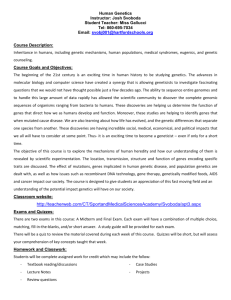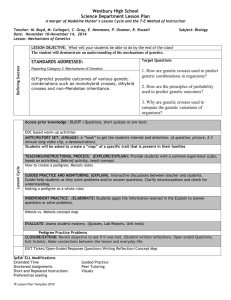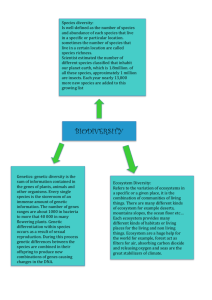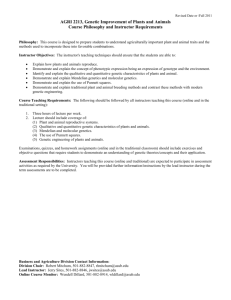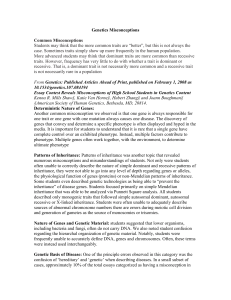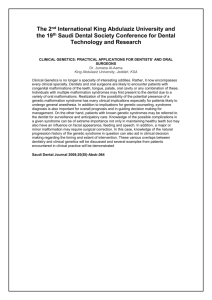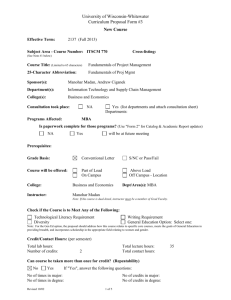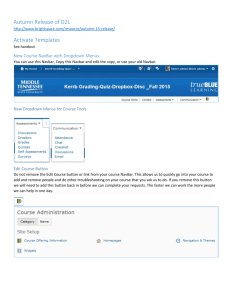human genetics syllabus
advertisement
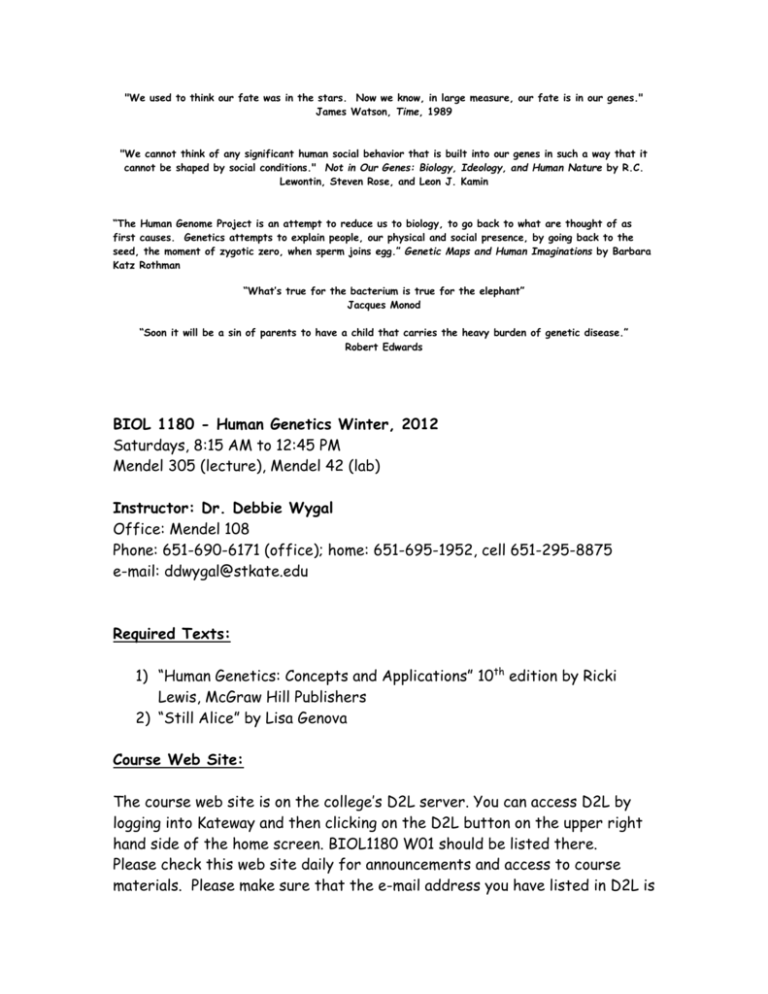
"We used to think our fate was in the stars. Now we know, in large measure, our fate is in our genes." James Watson, Time, 1989 "We cannot think of any significant human social behavior that is built into our genes in such a way that it cannot be shaped by social conditions." Not in Our Genes: Biology, Ideology, and Human Nature by R.C. Lewontin, Steven Rose, and Leon J. Kamin “The Human Genome Project is an attempt to reduce us to biology, to go back to what are thought of as first causes. Genetics attempts to explain people, our physical and social presence, by going back to the seed, the moment of zygotic zero, when sperm joins egg.” Genetic Maps and Human Imaginations by Barbara Katz Rothman “What’s true for the bacterium is true for the elephant” Jacques Monod “Soon it will be a sin of parents to have a child that carries the heavy burden of genetic disease.” Robert Edwards BIOL 1180 - Human Genetics Winter, 2012 Saturdays, 8:15 AM to 12:45 PM Mendel 305 (lecture), Mendel 42 (lab) Instructor: Dr. Debbie Wygal Office: Mendel 108 Phone: 651-690-6171 (office); home: 651-695-1952, cell 651-295-8875 e-mail: ddwygal@stkate.edu Required Texts: 1) “Human Genetics: Concepts and Applications” 10th edition by Ricki Lewis, McGraw Hill Publishers 2) “Still Alice” by Lisa Genova Course Web Site: The course web site is on the college’s D2L server. You can access D2L by logging into Kateway and then clicking on the D2L button on the upper right hand side of the home screen. BIOL1180 W01 should be listed there. Please check this web site daily for announcements and access to course materials. Please make sure that the e-mail address you have listed in D2L is one that you check daily. I will send out lots of information via e-mail and you are responsible for getting it in a timely manner. Course Objectives: 1) to learn the principles of Mendelian genetics, their extensions and exceptions and how to apply these principles to human genetic analysis 2) to learn the structure of genes and chromosomes, the mechanism by which genes are expressed, how gene expression is regulated, and how genetic variability is generated. 3) to learn about human genetic disease 4) To understand modern genetic technologies and their ethical, legal, and social implications. 5) to understand what impact genetic technology has had and may have upon women and minorities 6) To develop critical thinking skills and problem solving abilities 7) to learn how to find and interpret genetic information on the internet, in scientific journals, and in print and broadcast media 8) to become acquainted with laboratory techniques used by modern geneticists Course Requirements: 1. Problem Sets: There will be three problem sets during the trimester. They will be worth approximately 100 to 150 points each. The problem sets will be take-home and will emphasize application of concepts and development of analytical and critical thinking skills. Students may work together on problem sets but each student must submit the answers in her own words. Problem sets will be posted at the course web site on the following dates: January14 February 11 March 17 due: January 28 due: February 25 due: March 24 2. Quizzes: After each class, there will be an online quiz covering the major concepts discussed in lectures and reading. The quizzes will consist of multiple choice and matching questions and will be available to take from noon on the Monday after class until 8 AM on the day of the next class. They will be worth approximately 30 to 50 points each. The quizzes will be available at our D2L web site. The quizzes will be open book and you may consult your class notes, text, and PowerPoints while taking them. You may not consult with other students about the quizzes. You may re-take each quiz one time. 3. Media Report: One of the goals of this course is to help you become aware of and critically analyze news reports about genetics in the print and broadcast media. To that end, each student must find a news report from newspapers, magazines, television, or radio and analyze it. The media report should address the following questions in 2 to 3 double-spaced typed pages: (50 points) a) what does the report say? b) Identify the basic scientific concepts necessary to know in order to fully understand the report c) is the scientific information accurate and understandable? d) What is the significance of the information reported to both individuals and our society? e) What are the implications for women and minorities? f) What resources could an individual use to learn more about this topic? You need to identify two relevant web sites about this topic. Please include a copy of the news report with your paper. Each student will present a 5 to 10 minute summary of her media report to the class and submit a written report as well. The written report is due on the day of the presentation. Media reports will begin on January 14. There will be a sign-up sheet circulated at the first class meeting. The media report is worth 50 points. 4. Group Presentation. The best way to learn about something is to teach it to others!! To that end, there will be group oral presentation using PowerPoint. Each group of 2 to 3 students will investigate and report on a topic that is relevant to the class. A list of possible topics will be provided at the second class, although student are encouraged to “think outside the list” and pick something that interests them You will have a 30-minute block of time to make this presentation, and all persons in the group need to participate equally. A detailed outline (citing your sources and including a references cited section) is due on 3/9. The presentations will be at the last class on March 24. The outline is worth 25 points and the presentation 50 points. Originality and creativity in these presentations is encouraged. 5. Reflection paper on “Still Alice” by Lisa Genova When was the last time you read a novel in a science class? Well, we will! You will write a two to three page paper responding to the book. In the reflection paper, delve into your responses to critically analyze what’s going on. You may choose one particular aspect or topic that struck you and discuss that in some detail. You may discuss your overall response to the work. Reflect on how the book relates to the genetic issues we have learned in class. This reflection paper is due in the digital dropbox no later than 8 AM on March 24, the day we discuss the book in class. Papers will not be accepted after the discussion. The paper is worth 50 points. 6. Case studies and other in-class activities During most classes, we will do active learning activities such as case studies as an interesting way to learn the material without listening to me lecturing for long hours These will be worth approximately 20 points each. POLICY ON ASSIGNMENTS All assignments, except for the problem sets, must be typed using a word processor and submitted electronically using the drop box at our course web site. Once you enter the dropbox, there will be a folder for the assignment. Click on the folder name and then “add a file.” Click on the browse button to find the document on your computer. Highlight the file and click “open.” Then go to the bottom right of the screen and click “upload.” This will return you to the original screen. Click “submit” in the lower right corner and you are done. Policy on Academic Integrity: Please come and talk to me at any time during the trimester. I don’t have office hours but will set up appointments at your request. If, for some very good reason, you are unable to complete an assignment on time, please call, email, or come and see me so that we can discuss alternative dates. Please speak to me in advance of the due date. I can be contacted at my office, home, or by e-mail. I expect that students in this class will study together, and encourage this. However, please make sure that everything you turn in is written in your own words, not those of your texts or peers. Do not quote your notes or your texts. The information should percolate in your brain prior to being written. You are on your honor to prepare the answers for your exams by yourself. Special Considerations: If you have a visual, hearing, mobility, or other disability or if you have any other concerns or special needs regarding this course and would like to discuss accommodations, please contact me as soon as possible. Feel free to share with me any special considerations you might have regarding your performance in this class. I will try my best to meet your needs. Cheating will not be tolerated, and will result in a failing grade for the assignment in question. A second offense will result in a failing grade for the course. The format of WEC means that each class is about the equivalent of two weeks in the day college. It is important that you attend each class or you will quickly fall behind. Labs are part of the class time and missed labs cannot be made up. If you miss more than one class, I will expect that you will drop the course. . GRADES Your grade will be determined based on the percentage of total points you obtain. Grades will be assigned as follows: 93%+ 90%+ 87%+ 83%+ 80%+ 77%+ 73%+ 70%+ 67%+ 60%+ 60% A AB+ B BC+ C CD D F
